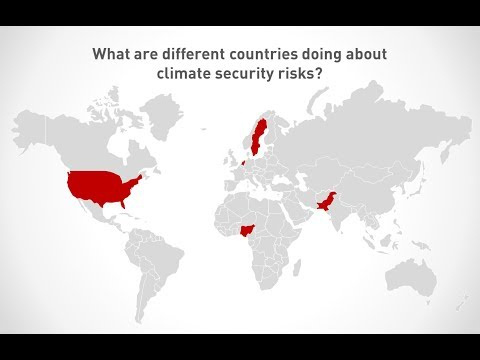What are different countries doing about climate security risks? 5 Answers
Featuring: Amina Mohammed, Alexander Verbeek, Alice Hill, Tariq Ghazi, and Ulrika Modéer. (Planetary Security Conference, December 2016)
NIGERIA - Amina Mohammed
"What are we doing about it? We see this as an opportunity to address root causes of making investments in government structures that give inclusion to everyone to look at our economy by investing in infrastructure so that we can actually create the jobs and the enabling environment. And last but not least, really bringing climate change as an integral part of our planning so that we do not seeing it as something that is added on as an appendage or an afterthought."
SWEDEN - Ulrika Modéer
"Sweden has a feminist foreign policy and climate is one of our top three priorities and this is because it is needed in the world of today. I think we see an increasing number of conflicts and also a lot of positive development that we have seen with a risk of being rolled back now with the risk of climate change as one of the major threats. So we prioritize this a lot, the broader engagements and broader view on security and climate change, but also women peace and security are two main priorities."
USA - Alice Hill
"The United States defense and national security community has been looking at the risks posed by climate change to fragile states. If we can find a way to overlay the climate risks on top of what are known as fragile states, we can better direct our aid, our support to ensure that those countries can withstand what we know are very, very damaging and destabilizing impacts of climate change. So the president signed an executive order requiring all of our science, intelligence and policy agencies creating national security policy to incorporate considerations of climate risks. That would of course help us to better understand what the risks are to fragile states."
PAKISTAN - Tariq Ghazi
"In the last five years there has been a recurrence of floods and therefore Pakistan has become very resilient in terms of the organizations and structures it has put in place to deal with these disasters on an ongoing basis.
And the principal organization that we have supporting this or coordinating all the activities is our National Disaster Management Authority, which works under the Prime Minister directly in his office and it has at its disposal the resources of the entire armed forces of Pakistan because they are the first responders because they have a reach throughout the country and they have the equipment and the resources and the manpower to be able to respond immediately to these disasters."
NETHERLANDS – Alexander Verbeek
"The impact of climate change and the potential danger that water poses to our countries, that is something we are used to and that we are working on and we have the expertise to help all kinds of other countries in the world with these challenges. You find Dutchmen working in Bangladesh, or find them in the deltas of the world from Vietnam to Egypt and to other places."










